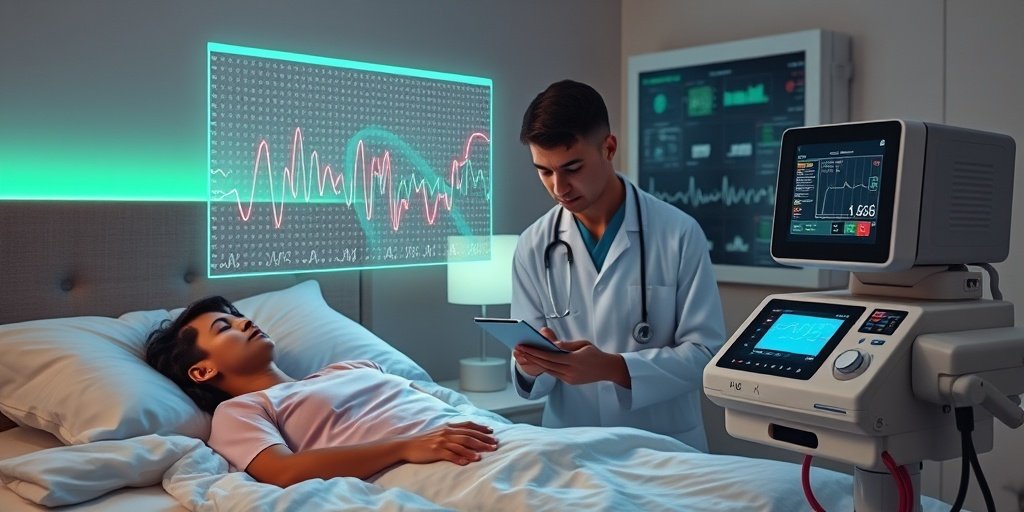⚡ Quick Summary
This study conducted a Bayesian meta-analysis to evaluate the effectiveness of machine learning models trained on heart rate variability (HRV) from electrocardiogram (ECG) data for diagnosing obstructive sleep apnoea (OSA). The findings revealed a pooled sensitivity of 79.0% and specificity of 75.0%, indicating a promising alternative to traditional diagnostic methods.
🔍 Key Details
- 📊 Dataset: 9 studies, 2,019 participants
- 🧩 Features used: Heart rate variability (HRV) from ECG recordings
- ⚙️ Technology: Machine learning models
- 🏆 Performance: Pooled sensitivity 79.0%, specificity 75.0%
🔑 Key Takeaways
- 💡 Machine learning models trained on HRV data show good diagnostic accuracy for OSA.
- 📈 Pooled sensitivity was found to be 79.0%, while pooled specificity was 75.0%.
- 🔍 Diagnostic odds ratio was calculated at 11.3, indicating a strong association.
- 🌍 The study included a diverse demographic, enhancing the generalizability of results.
- 🤖 No publication bias was detected, strengthening the validity of the findings.
- 🏥 Machine learning models demonstrated higher specificity than the STOP-BANG questionnaire.
- 🛠️ Potential integration into wearable devices could facilitate widespread screening for OSA.
- 🔄 Further validation in real-world settings is necessary to confirm these findings.

📚 Background
Obstructive sleep apnoea syndrome (OSA) is a prevalent yet often underdiagnosed condition that poses significant health risks, including cardiovascular diseases and metabolic disorders. Traditional diagnostic methods, such as polysomnography, are resource-intensive and not feasible for large-scale screening. This has led to the exploration of alternative methods, such as analyzing heart rate variability (HRV) from electrocardiogram (ECG) data, which can be more accessible and cost-effective.
🗒️ Study
The study aimed to assess the diagnostic accuracy of machine learning models trained on HRV data for detecting OSA in adults. Researchers conducted a comprehensive search across multiple databases, including PubMed and Embase, to identify relevant studies. A total of nine studies involving 2,019 participants were included in the meta-analysis, providing a robust dataset for evaluation.
📈 Results
The analysis revealed a pooled sensitivity of 79.0% (95% CrI: 74.9%-82.7%) and specificity of 75.0% (95% CrI: 67.9%-82.3%). The diagnostic odds ratio of 11.3 (95% CrI: 7.21-19.0) indicates a strong correlation between HRV analysis and OSA diagnosis. Notably, the specificity varied with demographic factors, while the architecture of the models and validation methods did not significantly impact the results.
🌍 Impact and Implications
The findings of this study have significant implications for the future of OSA diagnosis. The ability to utilize machine learning models trained on HRV data offers a scalable and cost-effective screening tool that could be integrated into wearable devices. This advancement could facilitate early detection and management of OSA, ultimately improving patient outcomes and reducing healthcare costs.
🔮 Conclusion
This study highlights the potential of machine learning in enhancing the diagnostic accuracy for obstructive sleep apnoea through heart rate variability analysis. With a pooled sensitivity of 79.0% and specificity of 75.0%, these models present a promising alternative to traditional diagnostic methods. Continued research and real-world validation are essential to fully realize the benefits of this innovative approach in clinical practice.
💬 Your comments
What are your thoughts on the use of machine learning for diagnosing obstructive sleep apnoea? We would love to hear your insights! 💬 Join the conversation in the comments below or connect with us on social media:
Electrocardiogram heart rate variability for machine learning diagnosis of obstructive sleep Apnoea: A bayesian meta-analysis.
Abstract
PURPOSE: Obstructive sleep apnoea syndrome (OSA) is a common yet underdiagnosed condition associated with significant health risks. Although polysomnography is the diagnostic gold standard, it is resource-intensive and unsuitable for widespread screening. Heart rate variability (HRV) derived from electrocardiogram (ECG) recordings has emerged as a promising, accessible alternative for OSA detection. Recent developments in machine learning have enabled automated HRV analysis, potentially offering a scalable screening tool for OSA. This study aimed to evaluate the diagnostic accuracy of machine learning-based models trained on HRV for detecting OSA in adults.
METHODS: We searched PubMed, Embase, Scopus, Web of Science, and IEEE Xplore (up to 20 October 2024) for eligible studies that assessed the accuracy of OSA diagnosis using AI models trained on HRV, compared to the apnoea-hypopnea index (AHI). Bayesian bivariate random-effects meta-analysis estimated pooled sensitivity and specificity. Risk of bias was assessed using QUADAS-2, and GRADE was used to rate evidence certainty.
RESULTS: Nine studies with 2,019 participants met inclusion criteria. Pooled sensitivity was 79.0% (95% CrI: 74.9%-82.7%) and specificity was 75.0% (95% CrI: 67.9%-82.3%). The diagnostic odds ratio was 11.3 (95% CrI: 7.21-19.0%). Meta-regression showed specificity varied with demographic factors, while model architecture and validation methods had no significant impact. No publication bias was detected.
CONCLUSIONS: Machine learning models trained on HRV show good diagnostic accuracy for OSA, with higher specificity than STOP-BANG and comparable performance to home sleep tests. Their scalability and potential integration into wearable devices offer a practical, cost-effective screening option. Further real-world validation is warranted.
Author: [‘Hao Y’, ‘Tan NKW’, ‘Gao EY’, ‘Au JXY’, ‘Toh NEX’, ‘Yong CL’, ‘Teo YH’, ‘Ng ACW’, ‘Leong ZH’, ‘Phua CQ’, ‘Ong TH’, ‘Leow LC’, ‘Huang GB’, ‘Tan BKJ’, ‘Toh ST’]
Journal: Sleep Breath
Citation: Hao Y, et al. Electrocardiogram heart rate variability for machine learning diagnosis of obstructive sleep Apnoea: A bayesian meta-analysis. Electrocardiogram heart rate variability for machine learning diagnosis of obstructive sleep Apnoea: A bayesian meta-analysis. 2025; 29:303. doi: 10.1007/s11325-025-03476-z